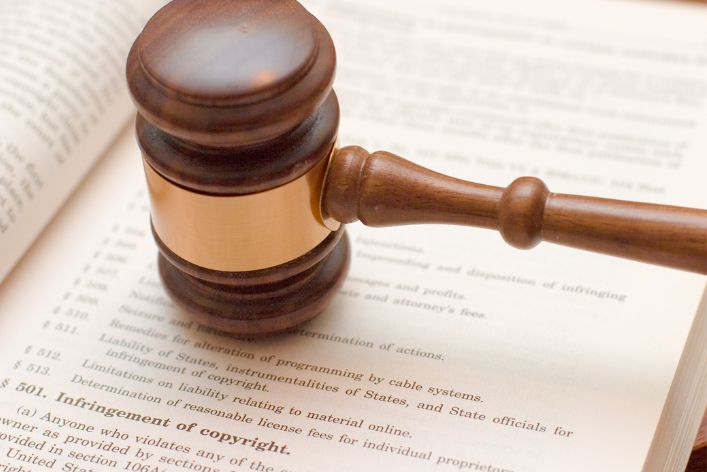The concept of intellectual property refers to the exclusive rights individuals or businesses hold over their ideas and creations. It can take various forms, such as patents, trademarks, trade secrets, and copyrights.
The importance of protecting intellectual property cannot be overstated. It ensures that original ideas and innovations are not exploited without the owner’s permission. This not only protects the creator’s financial interests but also encourages continued creativity and innovation in various fields.

The Producers Guild of America (PGA) is an organization that understands the importance of protecting intellectual property. It is a professional guild that offers membership to producers in the entertainment industry. The PGA has a reputation for protecting the intellectual property of its members.
For instance, the PGA has been vocal in advocating for stronger copyright laws and regulations. They believe that it is essential to protect the rights of their producers, including the right to control and benefit from their work. The PGA’s approach emphasizes the importance of protecting the creator’s financial interests, encouraging continued creativity in the entertainment industry, and safeguarding the integrity of the industry as a whole.
Protecting intellectual property is crucial for promoting creativity, innovation, and growth in various fields, including the entertainment industry. The PGA’s reputation for protecting its members’ intellectual property is a testament to the importance of this concept in the industry and beyond. It is vital to continue advancing policies that protect and benefit the creators of intellectual property to ensure future innovation and prosperity.
Read: What Does p.g.a. Mean in Film Credits?
PGA’s Best Practices for Protecting Intellectual Property
The Producer’s Guild of America (PGA) represents the interests of producers and makes sure their intellectual property is protected from infringement. The guild follows a strict protocol to ensure that its members’ work is safeguarded from unauthorized use, duplication, or distribution.
Overview of PGA’s Approach to Protecting its Intellectual Property
Intellectual property (IP) consists of trademarks, copyrights, patents, trade secrets, and other intangible assets. The PGA has developed a comprehensive strategy to protect its members’ IP, which includes:
- Registration of trademarks and copyrights.
- Monitoring online and offline piracy and infringements.
- Enforcement of legal measures against violators.
Description of PGA’s Registration Process for Trademarks and Copyrights
Registration is the first step to safeguard intellectual property. The PGA’s registration process includes the following steps:
- Identify the trademark or copyright that needs to be registered.
- Conduct a thorough search to ensure that the intellectual property is unique and not already registered by someone else.
- Apply with the government agency responsible for registration (such as the United States Patent and Trademark Office or the U.S. Copyright Office).
- Pay the registration fees.
- Wait for confirmation of registration and receive the registered trademark or copyright.
Explanation of PGA’s Monitoring and Enforcement Procedures for Producers Guild of America
The PGA employs a team of experts to monitor online and offline piracy and infringements of its members’ intellectual property. The team, with the help of technology, monitors websites, social media platforms, and other digital channels for any unauthorized use of registered trademarks or copyrighted material.
If they find any infringement, the team takes immediate action to remove the content and issue legal notices to the violators. The PGA also collaborates with law enforcement agencies, investigation firms, and legal teams to enforce its IP protection measures.
The PGA’s enforcement procedures include:
- Sending cease and desist letters to infringers.
- Filing lawsuits against repeat or major offenders.
- Seizing infringing products or copies.
- Filing complaints with internet service providers to take down illegal content.
The PGA’s IP protection system is an essential aspect of its mission to serve and support bona fide producers of film and television content. This system ensures that its members’ creative works are protected from unauthorized use, thus maintaining their value and integrity.
The PGA takes its members’ intellectual property very seriously, and it leaves no stone unturned in safeguarding it. Through its registration, monitoring, and enforcement procedures, the guild sets a high standard for IP protection in the film and television industry.
Read: The Impact of the Producers Guild of America on Film
Innovative Tech Solutions, Tailored for You
Our leading tech firm crafts custom software, web & mobile apps, designed with your unique needs in mind. Elevate your business with cutting-edge solutions no one else can offer.
Start NowPGA’s Trademarks
Understanding Trademarks and Their Importance
Trademarks play a vital role in the business world, including the entertainment industry. They represent a company’s brand, products, or services and help distinguish them from competitors. Trademarks can be symbols, logos, names, or even unique phrases. In the Producers Guild of America (PGA), trademarks hold immense value by protecting the organization’s reputation, identity, and intellectual property.
A. Why Trademarks Matter:
- Recognition: Trademarks make it easy for consumers to identify and associate with a brand.
- Protection: Trademarks legally protect a company’s intellectual property and prevent unauthorized use.
- Brand Value: A strong trademark can increase a company’s brand value and customer loyalty.
Recognizable PGA Trademarks
The PGA owns several trademarks that are crucial to its identity and recognition within the entertainment industry. Some of these recognizable marks include:
A. The PGA Logo:
The PGA logo, featuring a film reel and the letters “PGA,” is the organization’s primary trademark. It symbolizes the guild’s focus on film production and is easily identifiable within the industry.
B. The Producers Mark:
The “p.g.a.” mark signifies a producer’s membership in the guild and their adherence to the PGA’s standards. This mark is often seen in film credits, making it one of the most recognizable PGA trademarks.
C. PGA Awards:
The PGA’s annual awards show has its own distinct branding, which includes the event’s logo, promotional materials, and other assets.
Protecting PGA Trademarks from Infringement
The PGA takes the protection of its trademarks seriously to preserve its integrity and reputation. By implementing various strategies, the guild effectively safeguards its intellectual property from unauthorized use or infringement.
A. Trademark Registration:
The PGA registers its trademarks with the United States Patent and Trademark Office (USPTO). This registration grants the organization exclusive rights to use its marks in connection with its goods and services.
B. Monitoring Infringement:
The PGA actively monitors the market for potential infringement or misuse of its trademarks. This vigilance allows the organization to address issues promptly and protect its brand.
C. Legal Action:
If necessary, the PGA takes legal action against parties infringing on its trademarks. By enforcing its rights, the organization maintains control over its intellectual property.
D. Education:
The PGA educates its members about the importance of respecting and adhering to its trademark guidelines. This awareness helps prevent unintentional trademark infringement among guild members.
E. Licensing:
The PGA may grant licenses to third parties for the use of its trademarks in specific circumstances. Licensing agreements outline terms and conditions to ensure the proper use of the guild’s intellectual property.
Trademarks play a significant role in the Producers Guild of America’s identity and reputation within the entertainment industry. Recognizable marks, such as the PGA logo and the Producers Mark, help differentiate the organization and its members from competitors.
The PGA actively protects its trademarks through registration, monitoring, legal action, education, and licensing to maintain control over its intellectual property and preserve its brand value. By understanding and respecting the importance of trademarks, both the guild and its members can continue to thrive in the competitive world of film production.
Read: Producers Guild of America’s Influence on TV Shows

PGA’s Copyrights
What are copyrights and why are they important in the world of entertainment? Simply put, copyrights are exclusive rights given to creators of original works to control how those works are used, distributed, and reproduced.
For the Producers Guild of America (PGA), these exclusive rights are vital for protecting the valuable works of producers within the entertainment industry.
Common Copyrightable Works in the PGA
The PGA represents producers across all aspects of the entertainment industry, including film, television, and digital media. Some of the most common copyrightable works within the PGA include:
- Screenplays and scripts: The written works that serve as the foundation for films or television shows
- Visual and audio recordings: The final product that is viewed or heard by audiences
- Artwork and designs: The visual creations that serve as promotional material for films or television shows
- Software and digital media: The programs and applications used to create and distribute entertainment content digitally
These creative works are the backbone of the entertainment industry and without copyright protection, producers would not have the ability to control how their own works are used or receive proper compensation for their efforts.
Read: Top 10 Producers in the Producers Guild of America
Protecting Copyrights from Infringement
As with any form of intellectual property, producers need to protect their copyrights from potential infringement. The PGA takes several steps to ensure that its members’ works are safeguarded from unauthorized use.
- Filing for copyright protection: The first step in protecting a work is to file for federal copyright registration. This action establishes the creator’s exclusive right to reproduce, distribute, and display their work.
- Issuing cease and desist letters: If the PGA becomes aware of potential infringement, it may issue cease and desist letters to the alleged infringer. These letters typically demand the immediate removal of the infringing material and a cessation of any further use.
- Filing lawsuits: In some cases, the PGA may need to pursue legal action against individuals or companies that have infringed on their members’ copyrights. This litigation can result in monetary damages, injunctions against future infringement, or other legal remedies.
By taking these steps, the PGA can help ensure that its members receive the proper credit and compensation for their creative works. This protection not only benefits producers but also the entertainment industry as a whole by encouraging continued creativity and innovation.
Copyrights are an essential component of the entertainment industry, providing creators with the means to protect their original works. Within the PGA, these exclusive rights are vital for producers to receive proper compensation and ensure that their works are not misused or stolen.
Through federal registration and a willingness to take legal action when necessary, the PGA safeguards the valuable copyrights of its members. By doing so, the organization helps encourage continued creativity and innovation within the ever-changing world of entertainment.
Read: Producers Guild of America vs. Directors Guild
Seamless API Connectivity for Next-Level Integration
Unlock limitless possibilities by connecting your systems with a custom API built to perform flawlessly. Stand apart with our solutions that others simply can’t offer.
Get StartedPGA’s Online Presence
The Producers Guild of America (PGA) established an online presence to promote their brand. Online presence helps the PGA increase its reach and fosters a deeper engagement between the organization and its audience. The importance of online presence for the PGA cannot be overstated. It has become a vital tool for them in the digital age to reach out to their audience.
Potential Risks
With the creation of an online presence, the PGA is exposed to various risks. The PGA faces potential risks such as cyberattacks, hacking, and unauthorized use of its brand online. These risks could jeopardize their reputation and the trust that their audience has placed in them. Thus, the PGA needs to ensure that they monitor their online presence and implement appropriate enforcement procedures.
The PGA has established an online monitoring and enforcement procedure to protect the PGA’s brand and reputation. This procedure includes:
- Regularly monitoring social media channels and other online platforms where the PGA has a presence.
- Responding to comments and messages on social media promptly.
- Enforcing the PGA’s trademark and copyright rights against unauthorized use of their brand online.
- Documenting all infringements and taking action against offenders if necessary.
- Following up with any legal actions to protect the PGA’s intellectual property rights.
The PGA’s monitoring and enforcement procedures demonstrate their commitment to protecting their brand and reputation online. Establishing and implementing these procedures allows the PGA to control its brand perception and align it with its desired image.
Overall, the PGA’s online presence is an essential tool in promoting its brand, increasing engagement, and fostering deeper connections with its audience. However, with these benefits, online presence also exposes the PGA to risks that could damage its reputation. The PGA’s online monitoring and enforcement procedures help mitigate those risks, protecting the PGA’s brand and reputation online. The PGA’s commitment to online monitoring and enforcement is a critical component of its overall strategy to engage with its audience effectively.
Read: Women Pioneers in the Producers Guild of America
Conclusion
In conclusion, the PGA has implemented several best practices to protect its intellectual property, including registering trademarks and copyrights, using non-disclosure agreements, and monitoring online infringement. Any organization or individual needs to prioritize the protection of their intellectual property to maintain their competitive advantage and prevent others from profiting from their ideas.
We urge readers to assess their own intellectual property and consider implementing similar best practices to safeguard their valuable creations. This includes reviewing contracts and agreements with collaborators, using watermarks or digital fingerprints to discourage piracy, and registering trademarks and copyrights with the appropriate agencies.
By taking proactive steps to protect intellectual property, individuals and organizations can avoid costly legal battles and ensure the long-term success of their endeavors. Remember, intellectual property is a valuable asset that must be protected to maximize its potential.
Read: Essential Networking Tips for Producers Guild Members
Before You Go…
Hey, thank you for reading this blog to the end. I hope it was helpful. Let me tell you a little bit about Nicholas Idoko Technologies. We help businesses and companies build an online presence by developing web, mobile, desktop, and blockchain applications.
We also help aspiring software developers and programmers learn the skills they need to have a successful career. Take your first step to becoming a programming boss by joining our Learn To Code academy today!
Be sure to contact us if you need more information or have any questions! We are readily available.











